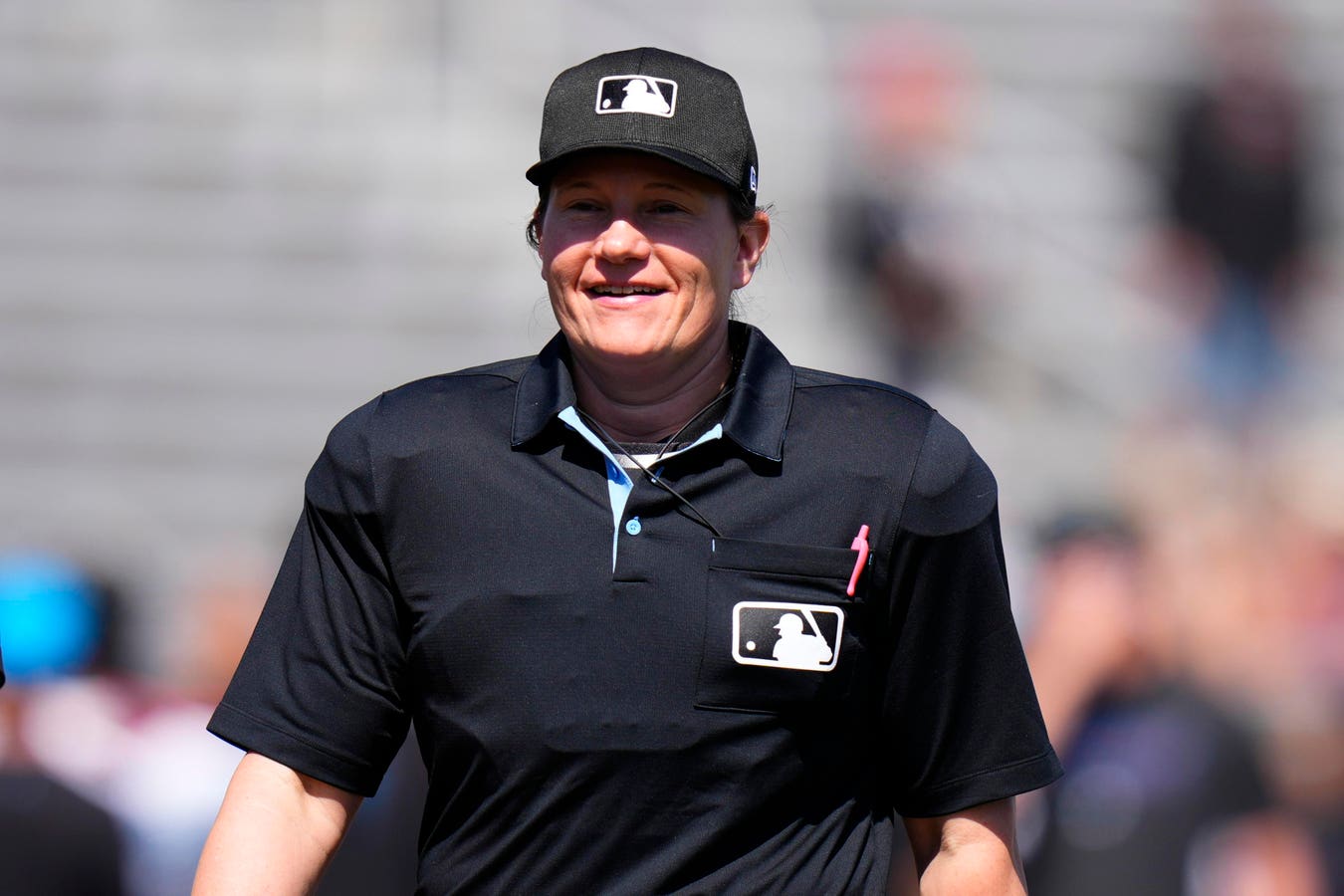Jen Pawol will become the first female umpire in a regular-season MLB game. (Photo by Rich Storry/Getty Images)
Getty Images
On Saturday, umpire Jen Pawol will shatter a glass ceiling when she becomes the first woman to officiate a Major League Baseball regular-season game. But breaking the barrier is just the start. Pawol will likely face intense scrutiny during her first years in the MLB..
Pawol has umped spring training MLB games, as have other women, but Saturday will be the first time a female umpire will officiate a regular season game. She’s scheduled to be a base umpire for the Atlanta Braves and Miami Marlins game on Saturday. On Sunday, she’ll be behind the plate calling balls and strikes for the same teams.
Baseball has been slower than most major leagues to bring women into its officiating ranks. The NBA introduced female referees in 1997 and currently has eight full-time female officials. In the NFL, the first female official was hired in 2015, and, in 2021, Sarah Thomas became the first woman to officiate in a Super Bowl.
Now, a woman will have a shot at officiating in baseball, and Pawol has prepared. She told AP News that she had umpired in over 1,200 minor league games. Still, MLB fans seem skeptical that a woman can or should officiate in a man’s game. When Minor League Baseball announced Pawol’s historic debut in the Majors on X, some offered congratulations, but fans of the sport were not shy about expressing their doubts. Some fixated on Pawol’s appearance, many dismissed her as a DEI hire, and several predicted a major failure. “RIP baseball,” one commented. And, all this before she’s even stepped on the field.
Many of the comments on X questioned whether a woman could have the decisiveness that the job demands. While decisiveness is critical for all leaders, it is particularly important for umpires, who make over 150 calls per game when they’re behind the plate. Women are often stereotyped as less decisive than men, but, in reality, studies show that women and men are equally capable of making decisions quickly.
Once Pawol gets her opportunity on the field, her decisions will likely be scrutinized more closely than those of her male peers. All umpires face constant criticism—it comes with the job. But, as a woman in the role, Pawol will likely face even more.
Research shows that women in male-dominated positions (like professional sports officiating) are judged more harshly for making a mistake than their male counterparts. Mistakes are unavoidable, but unlike most jobs, umpiring comes with an immediate public assessment. Close calls are rebroadcast, and the strike zone is superimposed on the screen, allowing fans to second-guess every ball and strike. Even the best umpires miss a dozen or more calls each game, and if Pawol’s accuracy falls even slightly below that standard, she will likely face plenty of pushback.
Even if she has a good first outing, Pawol won’t get to relax. Women in jobs typically held by men also face “prove-it-again” bias, where they are forced to prove their abilities and worth over and over again.
Next year MLB plans to implement the Automated Ball-Strike (ABS) challenge system. Under that system, human umpires will still make the initial call, but pitchers, catchers and batters can challenge ball and strike calls, and the technology will be used to determine the final ruling. Time will tell if players are quicker to challenge her calls than those of male umpires.
When Violet Palmer and Dee Kanter, the NBA’s first female referees, took to the court in 1997, they also received their share of negative feedback. Social media wasn’t a thing yet, but big-name players like Charles Barkley and Dennis Scott were not on board with female referees. Player Tim Hardaway thought a female ref was a “horrible” idea. Cedric Maxwell, a former Celtic, said while giving commentary on Boston radio that Palmer should “get back in the kitchen…and fix me some bacon and eggs.”
Now that everyone has a platform to weigh in on women’s progress, the backlash feels even louder. Indeed, when the NFL hired their first female referee in 2015, the comments on Twitter revealed the same sexist skepticism as those on Pawol. Little has changed since then.
Baseball may have been slower than other sports to bring women into officiating because girls are often steered away from baseball and into softball in high school and college. Pawol played Division 1 softball for Hofstra University.
Nonetheless, there is some change happening in baseball. Alyssa Nakken became the first female full-time MLB coach in 2022 when she joined the San Francisco Giants. And in 2020, Kim Ng became the first female general manager when she joined the Miami Marlins. And, with a new women’s professional baseball league launching next spring, the pipeline of women with experience in the sport may start to widen. As more women get involved in the sport, it should help curb some of the gender bias.
As for Pawol’s promotion, it’s good news for all women that yet another gender barrier is finally coming down. And while Pawol may have a bumpy road ahead, she’s proven that she can handle it.
